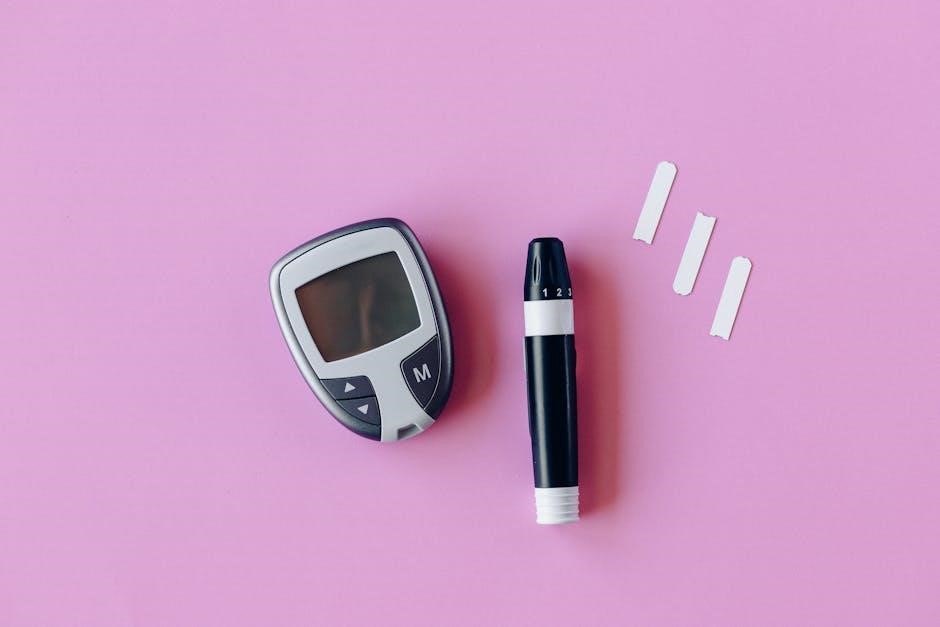
ab positive blood type diet pdf
The AB Positive Blood Type Diet, developed by Dr. Peter D’Adamo, suggests that individuals with AB+ blood should consume specific foods to optimize health and well-being.
1;1 Overview of the Blood Type Diet Concept
The Blood Type Diet, introduced by Dr. Peter D’Adamo, suggests that individuals should eat foods tailored to their blood type for optimal health. This concept proposes that blood type influences digestion and immunity, with specific foods either promoting or hindering well-being. By aligning diet with blood type, individuals can enhance energy, reduce disease risk, and improve overall vitality. This personalized approach aims to maximize health benefits.
1.2 Importance of Understanding Blood Type for Diet
Understanding blood type is crucial for tailoring diets to individual needs, as it influences digestion, nutrient absorption, and immune responses. Dr. Peter D’Adamo’s research highlights how specific foods interact with blood type antigens, affecting health. This personalized approach can prevent health issues, improve energy, and enhance overall well-being by aligning dietary choices with biological makeup.
Understanding AB Positive Blood Type
AB Positive blood type is rare, with unique antigen characteristics. It combines A and B antigens, making it a universal plasma donor but specific in dietary needs.
2.1 Characteristics of AB Positive Blood Type
AB Positive blood type is rare, combining A and B antigens. It is a universal plasma donor but has specific dietary needs. People with AB+ blood often have a unique tolerance to various foods and environments, making them highly adaptable. This blood type is less common, occurring in about 3.4% of the population, with distinct genetic traits influencing digestion and immunity.
2.2 History and Prevalence of AB Positive Blood Type
AB Positive blood type is one of the rarest, occurring in approximately 3.4% of the global population. Historically, it emerged as a result of genetic mixing between A and B blood types. This blood type is more commonly found in certain populations, with higher prevalence in areas with diverse ancestry. Its rarity and unique characteristics make it a subject of interest in genetic studies.

Core Principles of the AB Positive Blood Type Diet
The AB Positive diet focuses on balancing a mix of A and B dietary needs, emphasizing lean proteins, vegetables, and low-fat dairy to maintain optimal health.
3.1 Foods to Emphasize for AB Positive Individuals
AB Positive individuals should focus on a balanced diet rich in vegetables, lean proteins, and low-fat dairy. Leafy greens like spinach and kale, as well as turkey, chicken, and fish, are beneficial. Whole grains such as rice, oats, and quinoa are also recommended. Incorporating herbs and spices like parsley, garlic, and ginger can enhance digestion. Proper hydration with herbal teas or water is also essential for overall health.
3.2 Foods to Avoid for AB Positive Individuals
AB Positive individuals should avoid corn, wheat, and lentils, as these can cause digestive issues and slow metabolism. Red meat consumption should be limited, and processed foods high in preservatives and trans fats should be avoided. Dairy products like cheese and ice cream can also be problematic for some. Moderation is key with eggs and tomatoes to maintain balance and prevent adverse reactions.

Benefits of the AB Positive Blood Type Diet
The AB Positive Blood Type Diet supports improved digestion, enhances nutrient absorption, and boosts energy levels, promoting overall well-being and better health outcomes for individuals.
4.1 Improved Digestion and Nutrient Absorption
The AB Positive Blood Type Diet emphasizes foods that align with the body’s natural chemistry, reducing digestive discomfort and enhancing nutrient uptake. By focusing on compatible foods, individuals can experience fewer digestive issues, better absorption of vitamins and minerals, and a overall reduction in inflammation, leading to improved health and vitality over time;
4.2 Enhanced Energy Levels and Overall Health
The AB Positive Blood Type Diet helps improve energy levels by aligning food choices with the body’s biological needs. By avoiding foods that cause inflammation or digestive strain, individuals often experience increased vitality and mental clarity. This dietary approach also supports overall health by reducing the risk of chronic conditions, promoting a balanced lifestyle, and enhancing the body’s natural ability to function optimally and maintain well-being over time.
Scientific Research and Controversies
The blood type diet has sparked debate, with studies showing mixed results. Critics argue limited scientific evidence supports its claims, while proponents highlight anecdotal benefits and improved health outcomes.
5.1 Studies Supporting the Blood Type Diet
Some studies suggest the blood type diet may improve health outcomes, such as weight loss and enhanced digestion. Dr. Peter D’Adamo’s theory focuses on blood type-specific lectins in foods affecting health. For AB positive individuals, certain foods like lean meats and dairy are recommended. While research is limited, anecdotal evidence supports benefits. However, more comprehensive studies are needed to validate these findings for broader acceptance.
5.2 Criticisms and Limitations of the Diet
The blood type diet has faced criticism for its lack of robust scientific evidence. Critics argue that the theory is not universally applicable and may oversimplify individual nutritional needs. Limited studies support its claims, and some experts question its reliance on blood type as the sole determinant of dietary needs. Additionally, the diet may not account for other factors like lifestyle or medical conditions, limiting its suitability for all individuals.

Practical Meal Planning for AB Positive Individuals
Creating personalized meal plans for AB Positive individuals involves balancing protein, vegetables, and grains while avoiding foods that may cause intolerance or inflammation, promoting overall well-being.
6.1 Breakfast Ideas for AB Positive Blood Type
AB Positive individuals can start their day with lean proteins like eggs, turkey bacon, or tofu, paired with whole grains such as oatmeal or quinoa. Fresh fruits like berries or bananas are excellent choices, while green vegetables like spinach or kale can be added to smoothies or omelets. Avoiding dairy and processed meats is crucial, as they may cause intolerance. Incorporating these foods supports optimal digestion and energy levels throughout the morning, aligning with the blood type diet’s principles for better health and well-being.
6.2 Lunch and Dinner Recommendations
AB Positive individuals should focus on lean proteins like turkey, chicken, or fish, such as salmon or cod, for lunch and dinner. Pair these with vegetables like broccoli, carrots, or spinach, and whole grains like brown rice or quinoa. Avoiding red meat, processed foods, and dairy helps maintain balance. These meals support digestion and overall health, aligning with the blood type diet’s goals for well-being.

Hydration and Fluid Intake for AB Positive Individuals
Proper hydration is essential for AB Positive individuals to support digestion and energy levels. Drinking 8-10 glasses of water daily, along with herbal teas, is recommended. Avoid sugary beverages to maintain balance and optimal health outcomes, aligning with the diet’s principles for overall well-being.
7.1 Best Beverages for AB Positive Blood Type
For AB Positive individuals, the best beverages include water, herbal teas like chamomile and peppermint, and green tea for its antioxidant benefits. Alkaline water and fresh vegetable juices are also recommended to maintain pH balance. Avoid sugary drinks and excessive caffeine, as they can disrupt digestion and energy levels. Incorporating these beverages supports overall hydration and aligns with the diet’s goals for optimal health.
7.2 Avoiding Dehydration and Maintaining Electrolyte Balance
AB Positive individuals should prioritize consistent hydration to prevent dehydration. Drinking water regularly and monitoring urine color can help ensure proper fluid levels. Incorporating electrolyte-rich foods like bananas, avocados, and coconut water supports balance. Avoiding excessive alcohol and caffeine, which deplete electrolytes, is crucial. Balancing fluids and electrolytes helps maintain energy and digestive health, aligning with the diet’s principles for overall well-being.

Weight Management on the AB Positive Diet
Weight management on the AB Positive diet involves balancing nutrient-rich foods, portion control, and regular physical activity to maintain a healthy metabolism and body composition.
8.1 Tips for Healthy Weight Loss
For AB Positive individuals, healthy weight loss involves balancing meals with lean proteins, vegetables, and whole grains. Incorporating low-fat dairy and avoiding processed foods supports metabolism. Staying hydrated with water and herbal teas helps control hunger. Portion control and mindful eating are key to maintaining a calorie deficit without deprivation. Regular physical activity, such as walking or yoga, complements dietary efforts for sustainable weight management.
8.2 Maintaining a Balanced Weight
Maintaining a balanced weight for AB Positive individuals involves consistent dietary habits and regular physical activity. Emphasize lean proteins, vegetables, and whole grains while avoiding processed foods. Incorporate stress-reducing practices like meditation or yoga to support hormonal balance. Monitor portion sizes and meal timing to prevent overeating. Balancing metabolism and digestion helps sustain weight stability over time.
The Role of Supplements in the AB Positive Diet
Supplements can enhance the AB Positive Diet by addressing nutritional gaps, supporting digestion, and boosting energy levels. They are tailored to individual needs, promoting overall well-being.
9.1 Essential Nutrients for AB Positive Individuals
AB Positive individuals benefit from consuming vitamin C, vitamin E, and B12 to support energy and immune function. Calcium, magnesium, and iron are crucial for blood health. Omega-3 fatty acids from flaxseed and fish oil promote heart health. Probiotics and fiber-rich foods like yogurt and vegetables aid digestion. Antioxidants from berries and green tea protect against oxidative stress. Staying hydrated with mineral-rich fluids is also essential for optimal health.
9.2 Natural Remedies and Herbs for Optimal Health
AB Positive individuals can benefit from turmeric for inflammation and ginger for digestion. Ashwagandha and rhodiola support stress resilience and energy. Echinacea and elderberry boost immune function. Avoid sage and eucalyptus, as they may worsen digestive issues. Incorporate probiotics and omega-3 rich herbs like flaxseed for heart health. Herbal teas like chamomile and peppermint promote relaxation and digestion, enhancing overall well-being naturally.

Psychological and Emotional Well-being on the Diet
Adhering to the AB Positive diet can enhance mental clarity, stabilize mood, and reduce anxiety, fostering emotional balance and overall well-being through tailored nutrition.
10.1 The Impact of Diet on Mental Health
The AB Positive diet’s balanced approach can positively influence mental health by stabilizing blood sugar levels, enhancing neurotransmitter function, and reducing inflammation. Eating foods rich in antioxidants and omega-3 fatty acids, such as lean meats and vegetables, supports brain health, potentially lowering anxiety and depression. Avoiding processed foods and dairy may further improve emotional resilience and cognitive clarity.
10.2 Managing Stress While Following the Diet
Adhering to the AB Positive diet can help mitigate stress by promoting hormonal balance and reducing inflammation. Incorporating stress-reducing foods like turkey, lamb, and green vegetables supports adrenal function. Staying hydrated with alkaline-rich beverages and practicing mindful eating can further enhance emotional stability. Regular physical activity and sufficient sleep are also crucial for maintaining mental equilibrium while following the diet.

Comparing the AB Positive Diet to Other Blood Type Diets
The AB Positive diet balances elements from both A and B diets, emphasizing moderation and avoiding common allergens like red meat and gluten, unlike Types O, A, and B.
11.1 Differences from Type O, A, and B Diets
The AB Positive diet is unique, combining elements from both A and B diets but with distinct restrictions. Unlike Type O, it avoids high-protein foods and red meat. Compared to Type A, it allows more dairy and seafood. Type B avoids lectins in wheat, corn, and soy, while AB Positive focuses on moderation and balance, emphasizing neutral foods to maintain harmony in digestion and immune function.
11.2 Unique Aspects of the AB Positive Diet
The AB Positive diet is unique due to its adaptability, blending elements from both A and B diets. It emphasizes balancing immune-boosting foods while avoiding inflammatory ones. AB individuals can digest a wide variety of foods, including meats like turkey and lamb, beneficial dairy, and seafood. Neutral foods like grains, vegetables, and certain fruits are prioritized to maintain digestive harmony and immune health. This balance supports overall well-being and reduces inflammation.

Modern Research and Developments in Blood Type Diets
Recent studies validate the blood type diet’s benefits, with genomics advancing personalized nutrition. Research highlights improved immune function and weight management through tailored dietary approaches, supported by modern technology.
12.1 Recent Studies on Blood Type and Nutrition
Recent research confirms the blood type diet’s effectiveness, particularly for AB positive individuals. Studies highlight improved digestion, reduced inflammation, and enhanced nutrient absorption when adhering to blood type-specific dietary recommendations. Emerging data also link the AB positive diet to better weight management and reduced chronic disease risks, supported by advancements in genetic and nutritional science.
12.2 Advances in Personalized Nutrition
Advances in personalized nutrition have enhanced the AB positive diet’s effectiveness through tailored recommendations. Innovations in genetic testing and nutrient analysis allow for customized meal plans, optimizing health outcomes. Technology, such as diet-tracking apps, aids adherence, while ongoing research supports the diet’s benefits, reinforcing its role in personalized health strategies for AB positive individuals.
The Future of the AB Positive Blood Type Diet
The future of the AB positive diet lies in integrating modern health approaches and advancing personalized nutrition plans tailored to individual needs and lifestyles effectively.
13.1 Emerging Trends in Personalized Diets
Emerging trends in personalized diets emphasize integrating AI-driven tools and genetic insights to tailor plans like the AB positive diet. Advances in gut microbiome research and wearable tech enable real-time monitoring of dietary responses. Sustainable food choices and holistic wellness approaches are gaining traction, aligning with the diet’s principles. These innovations promise to make the AB positive diet more adaptable, effective, and widely accessible in the future.
13.2 Potential Integration with Other Dietary Systems
The AB positive blood type diet can potentially integrate with other dietary systems, such as Keto, Paleo, or plant-based diets, by aligning shared principles like eliminating harmful lectins or focusing on whole foods. This integration could enhance compatibility and offer a more holistic approach to nutrition, catering to diverse health goals while maintaining the core blood type-specific guidelines for better overall well-being.
The AB positive blood type diet offers a personalized approach to optimizing health and well-being. By tailoring dietary choices to your unique biology, this plan encourages a balanced lifestyle, promoting vitality and longevity. Embrace this tailored strategy to achieve your health goals and maintain a thriving, energetic life.
14.1 Summary of Key Points
The AB positive blood type diet focuses on personalized nutrition, emphasizing lean proteins, vegetables, and whole grains. It avoids certain meats, dairy, and processed foods to optimize health. Benefits include improved digestion, enhanced energy, and reduced inflammation. Hydration and strategic supplementation further support overall well-being. This tailored approach aligns with individual biology, fostering a balanced and vibrant lifestyle.
14.2 Final Thoughts on the AB Positive Blood Type Diet
The AB positive blood type diet offers a tailored approach to nutrition, promoting optimal health through strategic food choices. While individual results may vary, adhering to this plan can enhance digestion, boost energy, and reduce chronic inflammation. For those committed to personalized wellness, this diet provides a clear pathway to achieving balance and long-term vitality.

Resources and Further Reading
Explore detailed guides in the AB Positive Blood Type Diet PDF and books like Eat Right 4 Your Type by Dr. Peter D’Adamo for personalized nutrition insights.
15.1 Recommended Books and Websites
Discover essential resources like Eat Right 4 Your Type by Dr. Peter D’Adamo and visit his official website for tailored guidance. Explore reputable sites like Blood Type Diet and Verywell Health for detailed meal plans. For digital access, search for AB Positive Blood Type Diet PDF guides on platforms like Google Books or ResearchGate.
15.2 Where to Find AB Positive Blood Type Diet Plans
Access detailed AB Positive diet plans online through reputable websites like Dr. Peter D’Adamo’s official site. Downloadable guides and AB Positive Blood Type Diet PDF resources are available on platforms like Google Books and ResearchGate. Explore communities on forums or apps dedicated to blood type diets for customizable meal plans and practical advice.